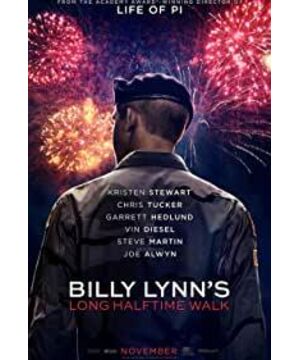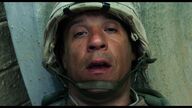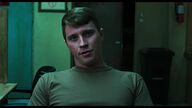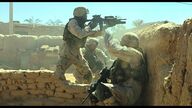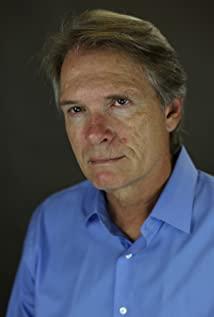Originally I wanted to watch "The Powerful Spy Next Door", but I was opposed. Well, if I want to see a movie that is on the cusp of the storm, I should consider it as a material for the circle of friends. I watched "Billy Lynn's Halftime Story" with this thought in mind, and now I think back on it, it's really rude. "Billy Lynn's Halftime Story" 19-year-old Texas soldier Billy Lynn, after joining the U.S. Infantry, was sent to the battlefield in Iraq, where he and seven other members of the assault team fought with local rebels in Iraq After a fierce battle of 3 minutes and 43 seconds, he and his comrades survived and escaped in a firefight. By chance, he became a national hero in the Iraq War. Billy Lynn has the most glorious and worst day of his life when he is called back to the U.S. with his comrades for a promotional tour and is invited to a halftime show at the Thanksgiving Open Football Game. Billy's heart was full of depression and struggle, and the war scene became a lingering pain in his memory. In the end, he chose to return to the battlefield. Technically, I'm watching 60fps, but it's smooth enough to surpass any other movie and feels more real and direct. What's more, the film is narrated in the first person. In those two hours, the audience seemed to enter Billy's body and experienced his long day from the same perspective. Back to the story, the structure itself is very simple, so simple that if you read the introduction of the film in advance, there will be no surprises when you actually watch it. But Ang Lee's strength lies in the fact that even if the story is so bland, it can trigger all kinds of emotions and thoughts in you, and you won't be able to play after the movie ends. It's like a kaleidoscope, you can have new feelings and inspiration every time you change the angle. It is talking about the 19-year-old boy on the other side of the world, but it also seems to be talking about yourself. Regarding war, unlike all war themes I have seen before, this movie does not vilify the enemy, nor does it beautify the soldiers. From an extremely daily perspective, I will tell you about the situation of the US military in Iraq. It is not always artillery fire, but mostly training and street patrols. And that 3 minutes and 43 seconds of the so-called fierce battle was the first time for this group of young fighters to go into battle. The gunshots sounded, and everyone panicked and forgot what to do. Squad Leader Mushroom shouted swear words and ordered everyone to fight. Then, the first one rushed out to break through, but was hit. The soldiers tore and shouted that the squad leader was shot, but only Billy rushed out. Suddenly, a jihadist rushed behind him, and after a melee fight, Billy ended the opponent's life with a knife out of instinct. The face of the battle has been in a panic, and the level of might is incomparable to any anti-Japanese war movie that we have seen before. As for the family, it is a social unit formed by a group of people who are connected by flesh and blood. At first, they were inseparable, and then gradually drifted apart due to reasons such as work and starting a family. It became a strange combination that requires TV as the background music to eat together. Mom cares about whether he eats well or not, Dad cares about his future, they will always be his harbor, but because of the huge gap in life trajectories, the people closest to him don't understand what Billy is thinking. And inability to empathize is fatal to interpersonal communication. After all, experiencing this kind of thing is irreplaceable. My sister was so worried about Billy that she was almost crazy and tried every means to pull him back from the army, but Billy finally chose to go back. Going back to the group of comrades who had shared fighting experience with him, the group of people who were originally in a parallel relationship turned out to be the people Billy cared about the most and was most reluctant to betray. That's the magic of the experience. Regarding the real society, cunning giants, slick brokers, and all kinds of melon-eating people represent the various states of this society. Most of them don't even have the least respect for these heroes. Rugby star asks Billy what it's like to kill WTF, this point is not even comparable to the jihadists. Although the jihadists hated the U.S. military and wondered how to kill them every day, at least they respected them and regarded them as opponents. This is the most unbearable thing for Billy. I think any military garrison who is risking his life every day to defend the country on the front line in a foreign country will be disappointed. Why did he come to Iraq to protect such a group of people? Apart from that, although coming back doesn't need to fight every day, it seems that there is nothing else to be happy about? At the bottom of the class food chain, there are few resources at our disposal, let alone poetry and distance. Instead of living in a daze, it is better to go to the battlefield with a group of sincere comrades in arms and feel that you are truly alive. I think this is the fundamental reason why Billy finally chose to go back to Iraq. Regarding belief, two characters in the play are obviously symbols of the two major religions. Mushroom represents Buddhism and Feishan represents Christianity. For Billy, they are two very beautiful existences, which illustrate the importance of spiritual belief. The real world will always disappoint people, and you should have some noble spiritual pursuit in order to be comfortable. Ang Lee said in an interview that his beliefs in his youth were destroyed one by one, and later he understood his own position and belonging, which is maturity. Billy, a young man, was forced to join the army in order to protect his sister. He was kind and soft, but he wanted to kill the enemy. Afterwards, he was constantly tormented by the bloody scenes that reappeared in his mind. So he said, "That was the worst day for me (one day I lost a trusted mentor and killed a man with my own hands), why are you all praising me?". This is obviously a destruction of Billy's beliefs, so he will feel cramped and uncomfortable under the flash, and this hometown he has missed for a long time feels unfamiliar to him. At first, he relied most on mushrooms representing Buddhism, and later he was most attached to Feishan representing Christianity. Ironically, both of them left him one after another. Maybe it's a metaphor for Billy, his problem religion can't help, he has to find a new spiritual belief of his own - to protect the scumbags with Dame. In addition, the above stills screenshot is one of my favorite shots in this film: mushrooms used religious concepts to teach Billy how to see war and life and death, which also touched Billy's inner ups and downs. One tree, two people, Zen is full of happiness, and happiness is always relative. Buddhism says that as happy as you are, you will be as miserable as you are. This statement is a bit confusing, so let me explain. For example, nowadays people's love comes too easily, so they don't know how to cherish it. The ancients did not have a mobile phone network, but there were flying pigeons to show love. It took several months for a letter to reach the missing person, and then half a year passed after receiving a reply. Under such circumstances, we can imagine how happy we are to be able to meet. For Billy and the others in deep Iraq, it is a happy thing to be alive to meet tomorrow. The extreme situation of garrisoning makes people's desires simple and simple, which is essentially an objective lightening of desires when they have to. To live is to be happy, to be healthy is to be happy. I think students who have been sick will have a deeper understanding of this text. Back to the plot, before Billy returned to China, he lived in a tense military atmosphere every day, and the only thing he hoped was to return to China with energy. However, after returning to China, facing the bad human and overly commercial social environment, he recalled that he went to Iraq the day before, A teenage hair-headed young man lived in an unknown small city in the United States. Could it be that life at that time was happier than on the battlefield? To give an inappropriate example, the Internet has brought us infinite convenience, but compared with before it became popular, do you really dare to say that we are happier now? The last thing I want to say is that Ang Lee is really good at making movies, from the forbidden gay love in Brokeback Mountain, the large scale of Lust and Caution, to the recent fantasy of Pi and this Billy's 120 frames. There are no earth-shattering plots, but there are enough bright spots to attract you into his delicate literary world. Aside from those stories, in fact, Ang Lee is always talking about human nature. Thank you for presenting another spiritual feast for us.
View more about Billy Lynn's Long Halftime Walk reviews


